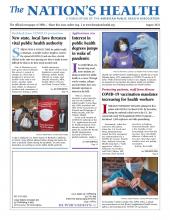
A Loma Linda student and teacher test wastewater for SARS-CoV-2 on campus.
Courtesy of Loma Linda University
California students study wastewater
Students at the Loma Linda University School of Public Health in California have taken an uncommon approach to monitoring COVID-19 spread on campus — testing wastewater.
Wastewater has long been used as an epidemio-logical tool for tracking drug and medicine use in a population, including antibiotics and opioids. Scientists can also test wastewater for RNA from SARSCoV-2, the virus that causes COVID-19.
In 2020, the Centers for Disease Control and Prevention announced the creation of a National Wastewater Surveillance System to understand how COVID-19 spreads in communities. Other researchers are studying wastewater as well.
“The RNA from COVID-19 can be detected in feces early in the infection before clinical symptoms,” Ryan Sinclair, PhD, MPH, an associate professor who leads the Loma Linda team, said in a news release. “This makes wastewater a perfect tool to monitor potential infections in buildings on campus.’
Through its weekly samples, the team of Loma Linda students and faculty can receive a four- to 10-day early warning on possible COVID-19 outbreaks.
The effectiveness of the program was a surprise for Jashmer Dhillon, an MPH candidate who joined the team in the spring. The monitoring system has proven to be an education in field innovation for students, he said.
The team has taken its methods beyond campus through a partnership with the San Bernardino, California, wastewater treatment plant, processing a weekly sample from the city
For more information, visit https://publichealth.llu.edu.
Georgia student activism highlighted
Emory University is celebrating its long history of student activism by spotlighting some of its leading practitioners.
In May and June, the university published “Student Activism, an Emory Tradition.” The two-part series profiles more than a dozen current undergraduate and graduate students that heed the call to action. Engagement by the student activists ranged from organizing Black Lives Matter and gun violence protests to registering voters and campaigning against single-use plastics.
“Students and their voices have enormous power,” Nithya Narayanaswamy, a sophomore, said in her profile.
Narayanaswamy is a co-founder of the Plastic Free Emory Project. Shortly after the series was published, she and other student leaders met with Emory University President Gregory Fenves, PhD, MS, to sign the “Break Free from Plastic Pledge,” committing the university to annual reductions in its single-use plastics.
Alyssa Greenhouse, a medical and MPH student, supported the #ThisIsMy-Lane campaign, which debunks the idea that people in the health field should not be a part of discussions on gun violence.
“There are opportunities to integrate advocacy in many of the things we do,” Greenhouse said.
The Emory students were also motivated to action by recent developments in the racial justice movement. About to enter his second year in a master’s program in development practice, Joshua Griffin organized and led roundtable discussions and Black Lives Matter demonstrations in Atlanta.
For more information, visit https://news.emory.edu.
- Copyright The Nation’s Health, American Public Health Association









